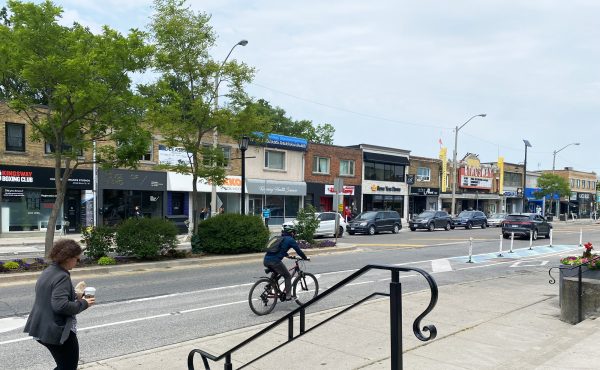Last week, Tyler Hamilton wrote a good column in the Toronto Star on the rise of car-sharing companies in Toronto. Entitled “Not owning a car in T.O. has never been easier,” Hamilton described how there are now three car-share companies in Toronto — ZipCar, AutoShare and Car2Go — that together have over 1000 vehicles at 550 locations around the city. To put this in perspective, that’s more shared cars than Bixi bikes and almost seven times more car-share locations than Bixi stations.
For an extra $45 over the cost of an annual membership in any of the three companies, Hamilton points out that members can get access to vehicles from all three companies. This includes the new pay-as-you-drive Car2Go vehicles, a fleet of 250 Smart Fortwo cars that can be picked up and dropped off in any City-owned Green P parking lot south of Eglinton between Jane and Victoria Park, don’t require advanced booking and can be taken one-way.
Car2Go is therefore something altogether different from the previously existing car-share systems. As Hamilton writes:
Kevin McLaughlin, founder and president of AutoShare, prefers to think of Car2Go as a ‘self-driving taxi’ service and not true car-sharing. ‘By far their (Car2Go’s) biggest impact, at least at the beginning, will be on taxis, Bixi (bike sharing), walking and even transit.
The new Car2Go service, argues McLaughlin, is so convenient that its competition isn’t other car-sharing companies but public transportation systems; namely, Bixi and the TTC.
Following the simple test, “if it looks like a duck, swims like a duck, and quacks like a duck, then it probably is a duck,” a unified car-share membership that includes Car2Go, I would argue, is essentially a public transportation system.
There’s one major problem with this argument. For at least the last 90 years, all forms of public or semi-public forms of mobility in Toronto have been either licensed, franchised or owned by the City or the Province. This includes Bixi, which is technically a “municipal capital facility” with a ten-year contract to operate in Toronto, similar to how in 1891 the Toronto Railway Company was granted a 30-year franchise to operate a street railway. As far as I can tell, the car-share companies have no such municipal relationship aside from purchasing parking permits with the City. In Paris, Autolib parallels Velib in its relationship to the government. Berlin’s electric car and bicycle network is linked to the city’s public transportation system.
This isn’t to say that the rise of private car-share companies is bad. If anything it shows that there is a latent demand for more transportation options that the existing public systems aren’t meeting which it is attempting to meet. But why was car-sharing allowed to go the private route while bicycle-sharing was implemented publicly?
As a result, car-sharing companies have been rapidly expanding while Bixi’s growth has been stymied in political gridlock. Since ZipCar’s Toronto launch in 2006, car-share vehicles in the city have grown by at least a factor of 12 from 80 cars to over 1000 (including Car2Go). Had Bixi grown at a similar rate, today we would have had the 3000 bikes and 300 stations originally planned by City Council.
Of course, that assumes bike-share is as popular and potentially as profitable as car-sharing. This gets at the root of the double standard underpinning this tale of two systems. Bixi was approached as a traditional transit system, a public service that would require a subsidy to be successful and that the municipality would therefore have to control to guard itself against escalating costs. Car-sharing, on the other had, was seen as akin to private car rental — a benefit to be enjoyed by those who can afford it and that can be left to the market where it will succeed or fail.
In hindsight, there’s no reason why car-sharing, a service more likely to reduce car use and compete with the TTC’s public transport monopoly, wasn’t municipally subsidized or owned. In contrast, Bixi may not have needed a subsidy to succeed (New York City’s system isn’t getting one) and might have expanded faster had it not been controlled by the City. If keeping Bixi affordable was driving public involvement, a subsidy could just as easily have been given to a company to expand based on the number of riders who signed up or been targeted to help certain groups buy memberships through refunds or discounts (i.e. student passes).
The tragedy of it all is that despite the City’s best intentions, old associations are allowing almost free reign to new auto-oriented transportation systems while bicycle-based systems remain constrained. This isn’t a call to sell off Bixi or for the City to pull a 1921 on the car-sharing companies. Rather, it’s to acknowledge that a double standard is still being applied to the way bikes and cars are perceived by public policy, and this is obstructing our ability to provide public services that shouldn’t be politically polarized issues in the first place.
photo by wyliepoon





20 comments
Funny too that when it comes to building and maintaining infrastructure, way more public money is spent for private cars than for public/private bikes.
I inquired about Bixi with Councillor Fletcher’s office a couple of months ago and they informed me that a report on Bixi expansion is expected to come to Council in the fall. Hopefully Bixi expansion will get the go ahead as the current service area is just too small to reach a critical mass of users and be sustainable in the long term.
I think it’s about the barriers to start up operations. Here in Montreal, our car-sharing for-profit company, Communauto, started in 1994 with a few cars at a few stations and grew organically, as awareness and demand grew. There was no need to dig tunnels or install docking stations. Just leases for parking spots.
A bike sharing service or public transportation system needs massive investment at the onset, which is more difficult to obtain in the private sector.
Jake,the problem is that if Bixi is a private company, without the injection of public money, it would not have taken off in the first place. It probably does not have the money itself to expand the service either. You can argue that the infrastructure investment is tilted in favour of cars, but you cannot say bike-sharing is not “allowed” to go private route.
Jake, I welcome your attention to car & bike sharing, but am a bit confused by the way your have set up your argument as “a double standard” – unless your intention is purely to try to inflame someone? You seem to be aurguing on the one hand that carsharing should be run by the TTC, and on the other that bike sharing is being stunted because it the model is based on co-operation with the city – or, even more odd, that somehow carsharing is being given a benefit because it receives no support from the City? There are a bunch of companies making bike sharing technology that you (or anyone else) is free to bring to Toronto via parking at private and/or Green P lots (or potentially use public bike rings with some systems). I have never heard that the City shut anyone down who wanted to do this. And I am sure that if someone stepped in with cash (eg a really big sponsor) Bixi would be open to growing faster, although I’m not familiar with their parking requirements. Carsharing has received support from the City of the last 14 years, from TAF loans to parking discounts, and this year’s expansion of the onstreet pilot project is a great, no-cost way to help more people LIVE WITHOUT A CAR in the city. (Ownership leads to use, and sharing to happiness.) So, yes, cities everywhere should encourage and support bike and car sharing (and other forms of new mobility, like shared taxis, smart parking, airport supershuttles, low speed EV’s…). But I’m not sure that I would say there is a “double standard” in Toronto. [disclosure: Yes, I started AutoShare, we have a partnership with Bixi, and I use both regularly – and love ’em!]
Kevin and Yu > My point was that we just don’t know whether Bixi would have needed that public injection of money to get it going. Car-sharing didn’t. The problem now is that because of that initial choice, the decision to expand Bixi is no longer linked to the observed demand for the service, like car-sharing, but has instead become a political choice.
Ok, that is clearer 🙂 The issue remains that bike sharing has to be financially sustainable, and my guess is that expansion (here or anywhere) is less political than economic. I don’t think Bixi has prevented any other bike sharing from coming to Toronto, today or in the future, regardless of their long term success, in the same way that AutoShare actually did all the hard work for the many companies & flavours of carsharing that will come to Toronto in our life times.
Kevin: it should be noted that the Yellow Bike program was shut down when the city decided to explore Bixi. That too was funded by the city, but it had little overhead costs, unlike Bixi.
I spent some time a few months ago trying to get councillors on the record on expansion of bixi…please send your councillor an email and send me any responses you get back and I will update the spreadsheet!
https://docs.google.com/spreadsheet/ccc?key=0ApEQxztgbm-UdFV4UmZJaC00bXptRF9VNnpoU2hIckE#gid=0
I actually think it is a little ironic that car sharing, which must involve astronomically high start up costs including vehicle purchasing and insurance, is privately owned while bike sharing, which is relatively more affordable, is public. I would have thought that only the public sector would have had the means to start up and operate car sharing while remaining in the black.
Business schematics aside, if they could get this operating in Richmond Hill I would very much consider getting rid of my car. Because I use an inter-modal approach for my transportation needs including cycling and public transit, I drive very infrequently. If I may gloat, a tank of gas in my car can last upwards of 2 months because I drive so rarely.
Jake, I believe Bixi asked for public money from the get-go. Also given the Montreal experience, Bixi will struggle without public money. That is ok, generally public transit requires public subsidy. But it is unfair to say bike-sharing is forced to go down this route when Bixi was keen to get financial support from the city.
Ben, at least Car2Go is subsidiary of a major auto maker which make the financial hurdle much easier to handle.
” My point was that we just don’t know whether Bixi would have needed that public injection of money to get it going.”
This is nonsense. Of course we know: any private bike-sharing company is welcome to start up, any day they want to. Today. Yesterday. Ten years ago. I’m waiting. No? None?
There aren’t any laws forbidding a bike-sharing company. Nothing in any way forbids it, except basic economics. Obviously, no private operator thought it was a workable business. Bixi isn’t a workable business even with city subsidies.
Your argument, if you have one, is with facts like “bicycles are easy to steal and vandalize” and “people aren’t used to paying to rent bicycles” and “bicycles are hard to operate in January” and “bicycles are hard to operate in the rain” and “there isn’t much bicycle parking in the city” and so on. None of these have anything to do with the city in any way preventing a private operation from starting up, which the city is not doing.
The fact is, bicycle-sharing is uneconomic. People who use a bicycle often can buy one for $100. The break-even rental fee for bicycles is probably something like the rental prices on the Toronto Islands, which is $8/hour absolute minimum. That’s to break even, with no profit. (And the Toronto Islands have a bunch of advantages like it’s hard to steal their bikes, no infrastructure to maintain, and so on.) No one wants to rent a bicycle at $8/hour when they can buy one for $100. The economies of scale are all in favor of buying a bicycle and not renting one. Businesses aren’t racing to start new bicycle-sharing businesses because it’s obviously a money-losing business. Bicycle-sharing is always done in conjunction with governments because someone has to subsidize those losses, if you want the service at all. Bicycle rentals exist profitably in specific places (“resort destinations”) to serve specific markets (“people who came on an airplane and don’t have their bike with them”), but for general use in a city, it’s a terrible business plan, because you’re competing against the $100 owned bicycle. This should be obvious.
Hmm so according to anonymous Michael’s logic, General Motors is worse than bixi, economically.
I take issue with this comment above by Michael:
“There aren’t any laws forbidding a bike-sharing company. Nothing in any way forbids it, except basic economics.”
Yes there is. No bike sharing company can start without the city’s permission. You cannot plop down bike stations without approval of the city (or breaking the law).
As for bike sharing being profitable, look to NYC or Paris to see private it in the works. I’m not against the government subsidizing this since it relieves transit ridership a little and its good to have more cyclists on the streets than drivers. But a little misinformation from commenters like Michael above need to be snuffed out.
” No bike sharing company can start without the city’s permission. You cannot plop down bike stations without approval of the city (or breaking the law).”
Are you saying that someone couldn’t put stations on private property without city involvement?
If the City wanted to provide for expansion of BIXI – it could provide space for BIXI stations at all TTC Stations, Green P parking lots and Community Centres / Pools.
This would make it easier to grow the Footprint of BIXI which I have used only ONCE since it was started, because it only covers the DT Core.
Expand East (Vic Park) / West (High Park) and North to Eglinton – and it would become much more useful.
The level of discourse here is astonishingly low. Spacing’s thesis is “The Man is preventing bike-sharing” although they can’t point to any sort of law or regulation backing that up. Micallef, defending this nonsense article, makes some nonsense statement about General Motors which I can’t even parse. And then we have random commenter Monica who thinks it’s illegal to rent bicycles (although she can’t point to any regulation to that effect).
Any company could, tomorrow, start a bike rental company in Toronto. Store your bikes in private lots where you’ve rented space, or a building you’ve leased, like any other private company (which is exactly how private auto rental companies work). You could even approach the city to rent space on public sidewalks, if you like, though that’s hardly necessary. Start it tomorrow. If you think any law or regulation forbids this, I’m going to need a citation.
Spacing: you’d do better to vet your articles for accuracy rather than being defensive about utterly false stories.
Anonymous Micheal: what kind of impossible task would it be to find enough pvt property (& at what crazy rental fee) to store & distribute all the Bixi’s out there now?
Ah, subsidy. What industry isn’t? Angry anonymous Michael focus so narrow.
Bike sharing is government sponsored because the willingness to pay to use a bike is substantially lower than the willingness to pay to use a car, yet the costs to set up and operate the system are not as different as you’d think.
Think you can get a $41m private subsidy in Toronto? Good luck. Citibike will probably be a good investment for Citibank in NYC, as all things New York permeate the American (and by extension global) media. Cheap advertising. There aren’t many other cities that can do it. London and Paris can, and still have a substantial public subsidy to make their schemes feasible. Toronto is not in that league.
Think you can make a go of private bicycle share, go right ahead and try. That’s the thing about private industry…if there’s enough market for it, you can find investors and set the thing up yourself, then reap the profits.
I’m all for bikes, and subsidizing them on the city’s part is good investment. Anything that takes cars off the road saves governments money on infrastructure maintenance and capital costs, so it’s a good investment on their part. But the idea in this article, that somehow we’d be living in a golden age of bike-sharing if only the government would stop sponsoring it, is ass-backwards and flat out wrong.